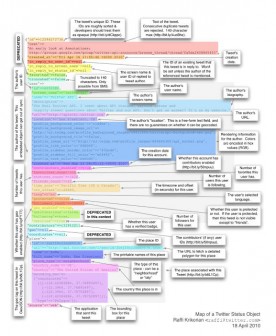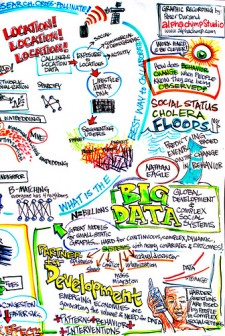In a world generating and storing tons of data every day, business owners need to learn how to harness it to get an edge.
Flickr photo courtesy of Luckey_Sun
There’s a behavioral marketing concept that goes something like this: The act of observing behavior actually changes the behavior.
It’s an easy concept to set aside, until you start to consider the enormity of the online behavior we are now able to observe–and therefore affect. All aspects of electronic data collection have led to reams and reams (or more aptly, terabytes and terabytes) of data to observe.
Social media and content marketing as a whole contribute even further to this mass of data, as brands create, curate and engage with users with greater and greater frequency and scale.
What Big Data Brings

The challenge is in extracting the data and analyzing it to glean business intelligence.
Through social media, people voluntarily share all kinds of information about themselves. Just check out the kind of “metadata,” shown at right, that can be extracted by deconstructing one single tweet, as posted by Twitter’s Director of Platform Services, Raffi Krikorian posted. In one tweet, we can see the following info:
- Name
- Title
- URL
- Company
- Location
- Bio
- Number of followers
- Who the user is replying to
- Device type
- Operating system
- Browser
- Preferred social media tool (Tweetdeck, Hootsuite, etc.)
And that’s just for a single tweet.
The magnitude of all of this data has led to the coining of a new term: Big Data.

Big Data is so voluminous, the byte sizes it refers to are terms we pedestrian folk don’t typically even hear–things like “petabytes,” “exabytes,” and “zettabytes.” Managing all of this data generates its own set of problems–things like storage, security and data protection, and compliance–but it also creates opportunities.
With so much data collected to analyze, there’s even a new job title emerging: data scientist. And qualified candidates are much in demand and hard to come by. (Did you hear that, parents with college-aged children?)
Big Data Tools
The process of mining data–even just social media data–can be daunting. There are rudimentary sites like InfoExtractor, which extracts limited types of information to be exported and analyzed, or Google Correlate, which allows comparative data analysis of search queries. Google has also launched BigQuery for analyzing larger data sets.
Big players like Oracle and SAP, who normally service only enterprise-level companies, have also begun to offer Big Data solutions for small and medium-size businesses. Here’s a more comprehensive list of robust data mining tools for your perusal.
What This Means for You
So what does this all mean for your own business? Big Data can help a company do many things:
- Profile customers
- Determine pricing strategies
- Identify competitive advantages
- Better target advertising
- Inform internal research and product development
- Strengthen customer service
This article features some interesting case studies of Big Data’s utilization by smaller firms.
So instead of brushing it off as something that only applies to huge companies, savvy business owners should be thinking about putting Big Data to work. Move beyond Google Analytics, Facebook Insights, URL shortener stats, and ordinary social media sentiment tools, and get good at normalizing data mined across all outposts.
And then, most important: Act on that business intelligence.
Comments(0)»
Leave a comment
Web Ad.vantage is a full-service online marketing company with core competencies in search engine optimization, PPC Campaign Management and online media buying. Visit our Internet Marketing Services section to learn more about our full range of services.
WebAdvantage.net encourages the reprinting of our marketing tips and articles. Before doing so, however, please contact us at for permission to do so. The company bio located above is required to accompany any reprint. Thank you in advance for your professional courtesy.
Pragmatic, professional advice with no hidden agenda.

Internet Business Forum








 back to top
back to top






